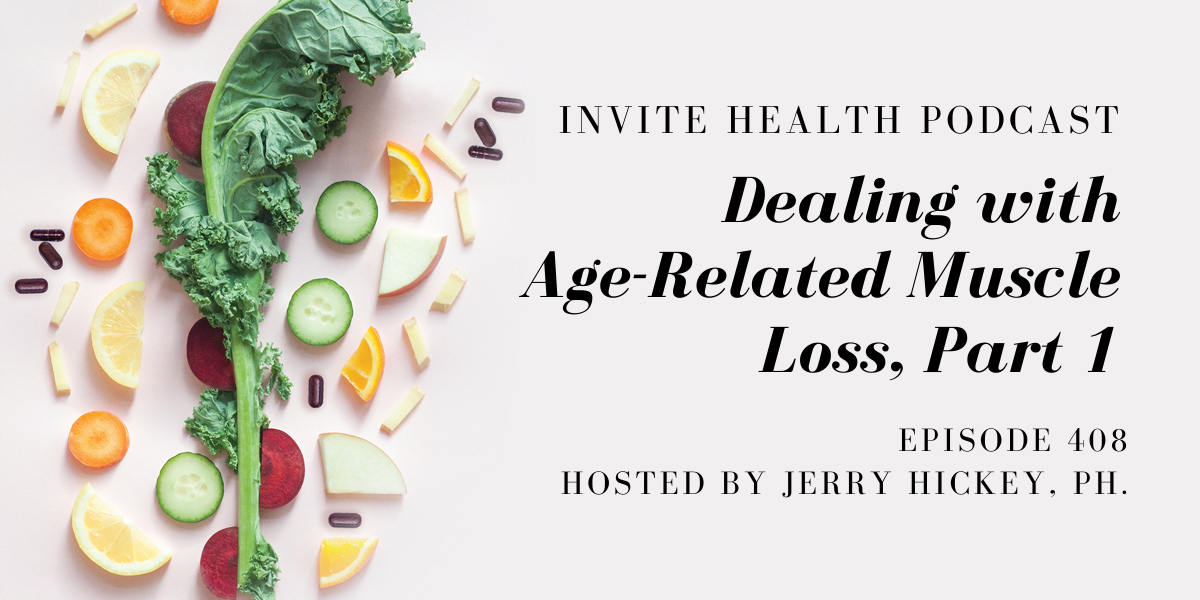Dealing with Age-Related Muscle Loss, Part 1 – InVite Health Podcast, Episode 408

muscle loss
InViteⓇ Health Podcast, Episode hosted by Jerry Hickey, Ph.
Subscribe Today!
There’s a disturbing, unhealthy trend that’s going on in people over the age of 50. It’s age-related and it’s another thing that smacks you in the face when you’re aging. It’s the age-related loss of muscle and strength. If it gets out of control, it’s called sarcopenia.†
Recent data on muscle loss
Here’s some recent data from the University of East Anglia. The researchers found there that people over 50 lose up to 1% of their skeletal muscle mass each year. This muscle loss is thought to affect 50 million people worldwide. This problem can lead to frailty and other poor outcomes such as sarcopenia, physical disability, Type 2 diabetes, reduced quality of life and increased risk of dying.†
You’ve probably heard the saying, “He’s strong. He’ll pull out of it.” This is usually used to relate to people who are sick or injured. Studies are showing that this saying does hold truth. Studies over the past five years have shown that older people with stronger grip strength survive longer, have a better quality of life and have longer health spans. They have also shown similar findings with people’s gaits, which is how they walk.†
The number of people facing this age-related muscle loss is expected to increase dramatically over the next 25 years. When you don’t have muscle, you’re more likely to fall and hit your head or break a hip. If you lose all of your strength and muscle, you can develop sarcopenia. You can also run the risk of developing frailty syndrome, which is terrible because all of the diseases associated with aging rush into your life, including Alzheimer’s disease, diabetes and heart failure.†
How to help support your muscles
There is actually a group of supplements that can help support someone facing age-related muscle loss. Today, we will discuss some amino acids that have been shown to be particularly helpful.†
Studies have shown that whey protein, when taken with other key nutrients, can help to greatly improve the physical strength of senior citizens. Researchers have found that if you combine whey protein, creatine monohydrate, Vitamin D, calcium and fish oil, this can be helpful for muscles. They found that by giving elderly men these supplements, they were able to notice improvements in deteriorating muscle health and overall strength. They also found that exercise helped them with their muscle loss.†
FISH OILS, AGING AND MUSCLE HEALTH – INVITE HEALTH PODCAST, EPISODE 335. Listen Now>>
Hydroxymethylbutyrate (HMB) is another nutrient that should be added to this list to help with muscle health. It’s a metabolite of the amino acid leucine and there are a lot of studies on how it helps to bolster muscle synthesis. I would also recommend ubiquinol, the active form of coenzyme Q10, and Green Tea HxⓇ.†
In this episode, Jerry Hickey, Ph. discusses how age-related muscle loss can impact your overall health. He details studies looking at how common muscle loss is and provides recommendations for nutrients that can help. Stay tuned for Part 2 of this episode, coming soon!†
Key Topics:
- Why strength is so important
- What are amino acids?
- Research on nutrition for muscle loss
Thank you for tuning in to the InViteⓇ Health Podcast. You can find all of our episodes for free wherever you listen to podcasts or by visiting www.invitehealth.com/podcast. Make sure you subscribe and leave us a review! Follow us on Facebook, Twitter and Instagram at InViteⓇ Health today. We’ll see you next time on another episode of the InViteⓇ Health Podcast.


